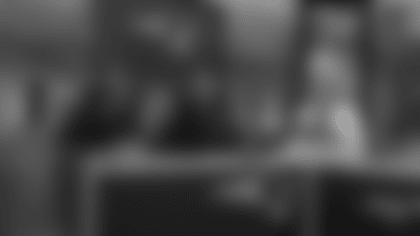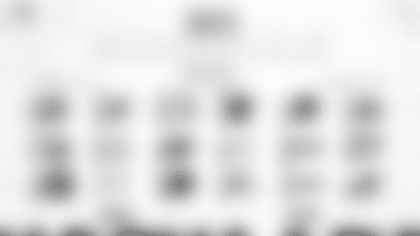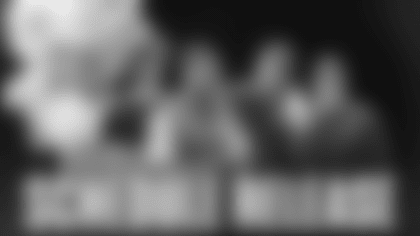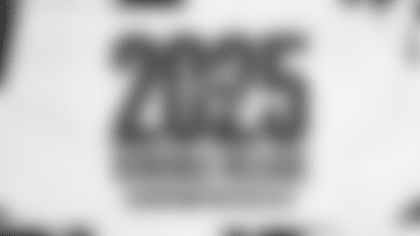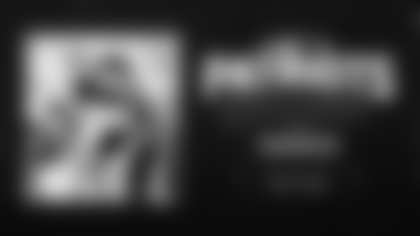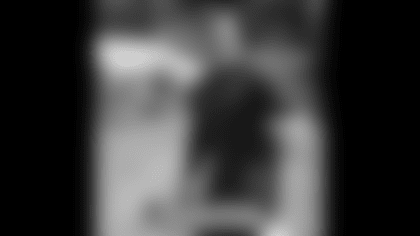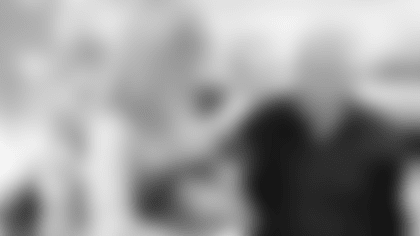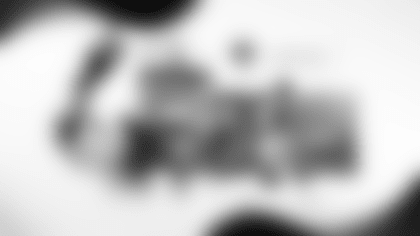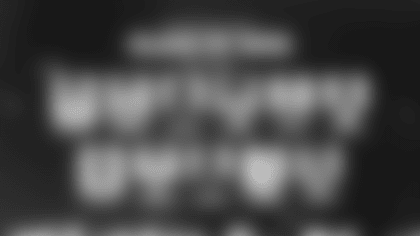BB: We've been watching the film here today. It's obviously been kind of a hectic day with the short week for the Giants and trying to do the tape evaluation on Washington. We have some roster moves that are on the horizon, so we're just kind of scrambling around a little bit. I'll try to clear up anything that I can for you if you need it.
Q: By the league changing the cut down date, does that make you have to scramble a little bit, personnel wise, sorting out your roster and looking at the board around the league?
BB: I think it's probably shifted a little bit from this week to next week because it's really an extra 10 guys, I think, 65. Last year it was 65 with the Europe exemptions. This year it's 75, but there are no exemptions. It's a few players per team, times 32 teams, call it 100 or so players, that will be on the roster this week that probably weren't on them last year at this time, at that cut time. It's just something that is different and I don't think it's monumental. It's just different. You're right, there will be more names. There will be 100 more names on the waiver wire at the 53 cut than there are at this 75, which last year was 65. How that will affect everybody else, I don't know.
Q: Were there certain things that really encouraged you when you were looking at the tape?
BB: There were some things that I thought we practiced and met on and talked about that we executed fairly well and got done. There were other things that weren't as crisp. Sometimes it was the same play that looked better one time than it did another. So we're still working for consistency. We played quite a few people in the game, so that adds to a little bit of the overall timing execution as well. There were some things that were good. There were some other things that we need to improve on. There were some new looks from Washington that we can learn from. I think this will be a really good film to teach off of and I look forward to showing the players because I think that they will see things and understand things a little bit better after we've had a chance to show it to them on tape.
Q: On Junior Seau, stylistically there was a play in the game last night where he did something we've seen him do a ton of over his career. It was like he sort of stood up right there against the guard and sort of threw himself into the gap. Junior's style of play is not one that we've seen from your linebackers in the past. Does Junior's style of play fit into your defense and that particular maneuver that he does?
BB: Yes, I think it does. Sure.
Q: It doesn't seem like a classic two-gapping kind of style.
BB: I don't think I've ever said that our linebackers are two-gap linebackers, so I wouldn't expect it to be.
Q: What did you see from him overall last night?
BB: He was in on a few plays and is starting to get the communication and playing with guys, the fits in the running game. Playing some drop-back pass responsibilities and stuff like that, built in from the practice reps. That's a start.
Q: How does Patrick Cobbs look to you so far this preseason?
BB: He is a young player that has had some nice looking plays. He's also had some other plays that he would need to improve on and be more consistent with. I think there are some positives there. There's a lot of things that he needs to do better that can help us more. He's made some impressive plays and made some nice runs and he hustles and he's a tough kid. What you want to see from a young player is a guy who continues to get better. They make mistakes, but you correct them and then hopefully they do them better the next time. Patrick is trying hard and he's been productive at times running the ball. That's where he's had most of his production.
Q: Do you tend to take his success running the ball as who is he running it against, like the second and third stringers of the other team?
BB: A player can't control who is on the other side of the ball, so they just have to do what they can do. But sure, in our evaluations, we try to take into consideration who is competing against who because, you're right, that's important, to understand which players you know and are established and you kind of know what their level of play is and other guys who may not be quite at that level. Again, all of that being said, I think you have to look at what the player does and try to make some kind of evaluation on it. Again, there are so many plays out there between three preseason games and all of the training camp practices and everything. I don't think we saw anything out there last night, probably for any player, that we haven't seen before, it's just a question of how often it is and how consistent it is, the decision making under pressure and things happening quickly around him and all of that. That's kind of really where more of the evaluation is and improving, whether they're doing it better than they did it the last time they were called on to do it.
Q: Do you start looking at Buffalo at all this week?
BB: In preseason games you try to take a look at everybody. That is part of preseason, for coaches and personnel people and scouts, is you're looking at other players and other teams and starting to get a little jump on them. Sure, of course we'll start breaking down Buffalo just like we would normally break down our next opponent during the regular season. People in our organization start on them, basically, two weeks before we play them. Then, after we play our game, then at the one week mark, then that is when everybody kind of shifts over and focuses more on that team, but then they jump ahead to the next team. There's part of that going on now, you bet.
Q: Will the players look at Buffalo at all at this point?
BB: I don't know how much they're seeing it. We have the stuff on our system where you can pretty much get to everything. I don't know this week, if they're looking at tape, which teams they'll be looking at. I'm sure they will prepare and look at the Giants, there's no doubt about that. I think this week is one of the busiest and toughest weeks in the entire season, because from a coaching standpoint, you're doing roster cuts. You're preparing for a preseason game. You're starting to prepare for a regular season game. You're thinking about how your team is going to look opening day. You're thinking about how your team is going to look in a month or two months from now. You're looking at other players and other situations across the league that may present themselves that may be an opportunity for you. There's a lot of balls in the air, no doubt about it. It's not an easy time for anybody. Players are getting ready for a game. They have a little apprehension maybe about some of their situations as the team is being constructed, working with different guys. Sometimes there are some moving parts there as to which people they will be spending most of their playing time with or how that will get broken up and getting their timing and familiarity with the guys they're going to be out there with. In some cases that maybe isn't totally established yet in a certain position or two. That's just the way it is at the end of preseason. There are a lot of things like that going on.
Q: How does Johnathan Sullivan look? Is he improving?
BB: Yes, he sure is. He definitely is. I think every game he has played better and he's practiced better.
Q: On the kickoffs last night, I noticed a number went into the endzone, a lot hanging up on that five/six yard line area. Is there ever a play on a kickoff where you tell the kicker to hang it up at the five yard line or do you want every kick, if at all possible, to go into the endzone?
BB: If you can kick it into the endzone for a touchback that's the ideal kick. If it's not a touchback, then the opponents are going to return them. An extra tenth of hang time, let's just say hypothetically, an extra two-tenths of hang time with the ball on the two yard line is probably a lot better than two-tenths less hang time with the ball on the goal line. So it's a trade off between height and distance. Those balls are going to be returned regardless, but if you think you can cover more ground in a couple tenths of a second with the extra distance, then that trade off can be worth it. I think the bottom line is for the coverage is when you're covering a kick you have to be ready to cover whatever the kick is. You don't know where it's going to land so you don't worry about it. You just go out there and cover it and adjust to it as you see it developing. That's what special teams is all about. It's organized chaos. You have the basic set of guidelines and responsibilities, but each kick is different - the direction of it, the time of it. Then, each returner from week-to-week is different, so the speed of the returner, his quickness and the angles and so forth. It's all the same, but they're all different. That's what special teams is. It's a lot of decision making out there based on all of those factors and leverage points and so forth. Whether you're blocking out in open space or covering or running the ball or trying to tackle the guy with it. You try to set up a basic structure for those players, whichever side of the ball you're on, but within that, you have to make a lot of adjustments based on things that happen once the punter or kicker's foot hits the ball, then all [heck] breaks loose and you have to adjust within those responsibilities, but that's the way it always is.
Q: Will you be making any roster moves before the cut down date?
BB: We're probably going to talk about that a little bit later this evening. In any case, it has to be done by Tuesday at four. We'll just have to see how it goes. I couldn't commit to anything right now one way or the other.
Q: What do you say to fans that think from watching the game last night that the offense is a juggernaut?
BB: Well, as I've been saying, this game was a step in our preparations, it was part of the process. Some things were okay and hopefully we can continue to build on those. Other things were a little less than okay and they need to be corrected and improved and that's what the process is, so that's what we're going to do.
Q: Back to taking a look at the different rosters this week– does it force you to play more of the regular players that you would take into the regular season as opposed to guys that you know aren't going to make your team? Does it change that equation?
BB: I don't know, but we'll do what we think is best for the football team based on all of the things that we have to take into consideration both from the team standpoint and for each individual player. How exactly that is going to play out, I don't know. Right now our big concern is to go through the Redskins tape, be ready for the team when they come in tomorrow to a) make those corrections and adjustments and teach from it and b) just start getting ready for the Giants. We have to, as a staff, be ready to make some roster moves in order to comply with the roster limit by Tuesday at four. How all of that is going to manifest itself in the Giant game on Thursday night, I'd say we're somewhere between 48 and 72 hours away from probably even tackling those questions. I couldn't answer those now.
Q: With you guys opening the season on a Sunday this year, how will that affect you going into the Giants game? Is it different this year than in the past because you don't open up on a Thursday night?
BB: Yes, I think it will definitely be different because we'll have a little bit more time to get ready for that opener and we won't be nearly as rushed as we have the last couple of years, going from Thursday to Thursday. I'm not saying that makes it any easier, I'm just saying from a scheduling standpoint, you're not going right from one game into the other one. Like I said, we'll take the Washington game, we'll the Giants game and the scouting report in preparation and then when we're done with that, then we'll setup our preparation schedule for Buffalo. I think that would fall on more of kind of like a Monday night game type of week, where you have an extra day to prepare. That's probably about what we'll have, four days instead of three.
Q: What would be an average for a team sending an extra rusher in a game? Is 25 percent about right? 50 percent?
BB: It really depends on the team. Some teams you might get it 10 percent. Other teams you could get it 70 percent. It really just depends on the team and sometimes that varies from game-to-game or a team that might blitz heavily against one team and then might not blitz or pressure too much against the next team. So it's really pretty much on a case-by-case basis and especially at this time of year when teams are working on different stuff. Sometimes you go into a game and say, 'Okay, we really want to work on our pressure defenses this week. We're going to call a lot of them,' and then the next week you say, 'You know what? We got a lot of those calls last week, this week we really want to concentrate on our zone coverages,' or, 'Our man coverages,' or whatever it is. It's very unpredictable at this time of year. I think offensively you always want to be prepared for it because you don't want to get into situations where you can't handle what they're doing and then they start pressuring you and you end up with a lot of negative plays, which doesn't allow you to run your offense and you don't want your quarterback and running backs to get blindsided in the backfield and all of that. You want to at least give everybody a fair chance by being able to block them and pick them up. That sometimes is a lot easier said than done.
Q: When Washington went to its pressure last night, how did you feel your pass protection responded?
BB: Blitz pickup is such a team thing. In some respects, it's a lot easier to block than an individual rush because the rushers have less space. If you send six guys, then everybody has a pretty limited area where they can rush, but they have more people and you have to get it coordinated so that you have the right guys blocked and the quarterback has the opportunity to throw. It's a team thing and it sometimes affects the quarterback route timing based on how many they bring and sometimes where they're coming from. There's a lot of coordination that has to happen, just from a blocking standpoint. Like I said, I think the actual one-on-one blocking is easier because those players have less space to work in. There were some times when we had to throw hot, didn't get it picked up cleanly. There were some other times where we blocked them and were able to get the ball down the field. So I think it was, again, a learning situation. Sometimes I thought we did a pretty good job with it. Other times, I think we could have handled it better. We got a lot of good looks. Washington gives you some tough situations to block, so it was good for us and we'll learn a lot from watching the film.
Q: Have you talked to Rodney [Harrison] and Dan [Koppen] and how are they feeling?
BB: I haven't talked to them today. I talked to them last night. I don't think there were any major problems. Like anybody, the first time you play after a while, you probably experience a little bit of soreness from the contact in the game that you didn't simulate in practice. I don't think there were any major problems.



